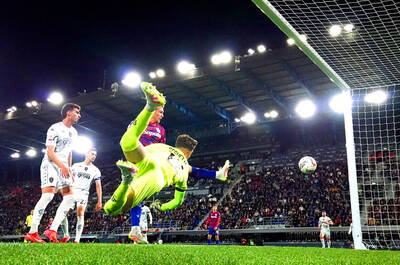Asian nations will without doubt bag plenty of medals at the Olympics but what is blindingly clear is that host China will outdo all its regional competitors.
At the 2004 Games in Athens 15 Olympic Council of Asia (OCA) nations fought their way onto the medal table.
A rampant China had its best-ever performance, finishing second overall to the US with 32 gold, while Japan with 16 gold came fifth. South Korea’s nine gold earned them ninth place.
The key question next month will be whether China can topple the US as the world’s most powerful sporting nation.
“China has an incredibly strong team. Host nations generally have home-field advantage,” said Steve Roush, the US Olympic Committee chief of sport performance.
“It may keep me up at night but it’s keeping up coaches and young athletes around this country too. There’s a job to be done,” he said.
While the three Asian heavyweights should again take the bulk of the glory, smaller fry like Thailand, Taiwan and Hong Kong put athletes on the podium in 2004 and will be looking to improve in Beijing.
Mongolia, Iran, Indonesia, North Korea, Uzbekistan, the United Arab Emirates, Kazakhstan, Syria and India also tasted limited success.
While lacking in blue ribbon events such as athletics and swimming China remains dominant in diving, table tennis, and badminton. It is also strong on the shooting ranges while its women’s weightlifters are top class.
Hurdler Liu Xiang is their great hope on the track, while Wu Peng could pick up a medal in the pool.
With resurgence in judo, swimming, wrestling and gymnastics, Japan, Asia’s top nation sporting power before China bulldozed its way to the top, also did better than expected in Athens and will want to build on that in Beijing.
Their key aim will be overtake Australia in the medals table while keeping archrival South Korea at bay.
“We are targeting gold medals in two digits and a total of more than 30 medals. That is the bottom line,” said Tomiaki Fukuda, head of Japan’s delegation to Beijing.
They have high hopes for judo icon Ryoko Tani to win her third straight Olympic title while Mizuki Noguchi has her marathon crown to defend. In equestrian Hiroshi Hoketsu is Asia’s oldest competitor at 67.
The South Koreans have at least one trick up their sleeve in teenage swim sensation Park Tae-hwan, who burst onto the scene at the 2006 Asian Games when he took three freestyle gold medals.
He followed it up with a stunning upset victory in the 400m freestyle at the world championships last year in Melbourne, inspiring other Asian swimmers as he gate crashed the usual US-Australian domination of the sport.
He is South Korea’s first world swimming champion and there are high hopes for him in Beijing.
Elsewhere, the region has some of the world’s best boxers, with Thailand and Uzbekistan having the talent to cause jitters in traditional Olympic power Cuba.
Thailand has one of its strongest boxing teams ever, led by defending light-welterweight champion Manus Boonjumnong, flyweight Somjit Jongjorhor and bantamweight Worapoj Petchkoom.
“In previous editions, we rested our hopes on one or two boxers to take the medal,” said Taweep Jantararoj, president of Amateur Boxing Association of Thailand. “For this Olympics, everyone has a chance.”
Taiwan is a power in taekwondo, while badminton and table tennis are Asian domains. It will be the rest of the world trying to muscle into these sports rather than the other way round in Beijing.
Defending badminton champion Taufik Hidayat of Indonesia will again be out to upset world No. 1 Lin Dan of China, while Lin’s girlfriend Xie Xingfang is the player to beat in the women’s event.
Paddlers from Hong Kong and Singapore will be snapping at China’s heels in the table tennis, where Wang Hao and Zhang Yining are the best players currently on the planet.

Bologna on Thursday advanced past Empoli to reach their first Coppa Italia final in more than half a century. Thijs Dallinga’s 87th-minute header earned Bologna a 2-1 win and his side advanced 5-1 on aggregate. Giovanni Fabbian opened the scoring for Bologna with a header seven minutes in. Then Viktor Kovalenko equalized for Empoli in the 30th minute by turning in a rebound to finish off a counterattack. Bologna won the first leg 3-0. In the May 14 final in Rome, Bologna are to face AC Milan, who eliminated city rivals Inter 4-1 on aggregate following a 3-0 win on Wednesday. Bologna last reached the

If the Wild finally break through and win their first playoff series in a decade, Minnesota’s top line likely will be the reason. They were all over the Golden Knights through the first two games of their NHL Western Conference quarter-finals series, which was 1-1 going back to Minnesota for Game 3 today. The Wild tied the series with a 5-2 win on Tuesday. Matt Boldy had three goals and an assist in the first two games, while Kirill Kaprizov produced two goals and three assists. Joel Eriksson Ek, who centers the line, has yet to get on the scoresheet. “I think the biggest

From a commemorative jersey to a stadium in his name, Argentine soccer organizers are planning a slew of tributes to their late “Captain” Pope Francis, eulogized as the ultimate team player. Tributes to the Argentine pontiff, a lifelong lover of the game, who died on Monday at the age of 88, have been peppered with soccer metaphors in his homeland. “Francisco. What a player,” the Argentine Football Federation (AFA) said, describing the first pope from Latin America and the southern hemisphere as a generational talent who “never hogged the ball” and who showed the world “the importance of having an Argentine captain,

Noelvi Marte on Sunday had seven RBIs and hit his first career grand slam with a drive off infielder Jorge Mateo, while Austin Wynn had a career-high six RBIs as the Cincinnati Reds scored their most runs in 26 years in a 24-2 rout of the Baltimore Orioles. Marte finished with five hits, including his eighth-inning homer off Mateo. Wynn hit a three-run homer in the ninth off catcher Gary Sanchez. Cincinnati scored its most runs since a 24-12 win against the Colorado Rockies on May 19, 1999, and finished with 25 hits. Baltimore allowed its most runs since a 30-3 loss to